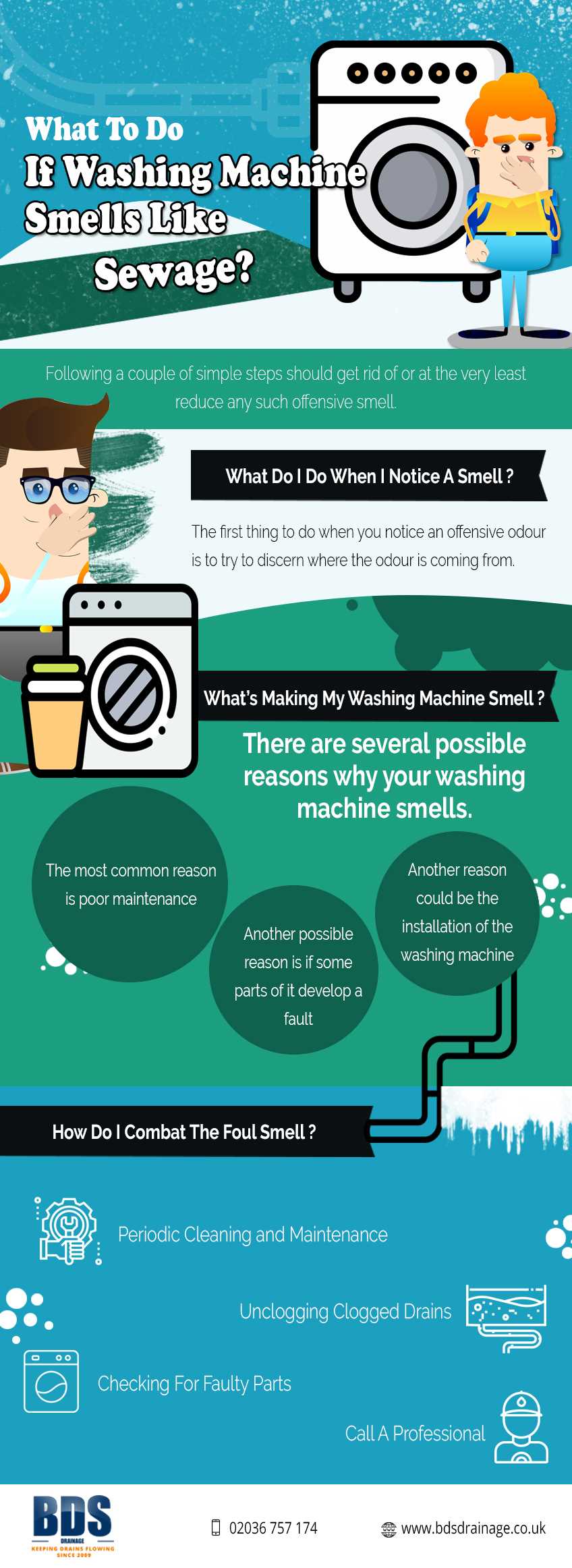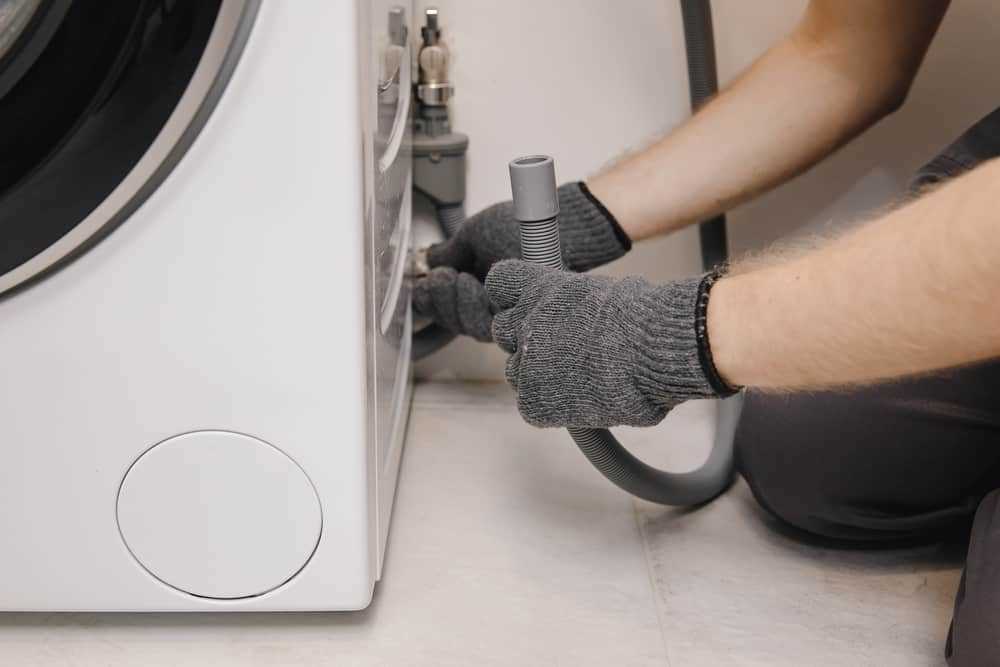




Having a washing machine that emits a sewage-like smell can be unpleasant and concerning. There are several potential causes for this unpleasant odor, ranging from simple maintenance issues to more serious underlying problems. In this article, we will explore the common reasons why your washing machine might smell like sewage and provide possible solutions to eliminate the smell.
A common culprit behind the sewage-like smell in your washing machine is a buildup of bacteria and mold. This can occur when moisture and detergent residue combine, creating the perfect breeding ground for these microorganisms. As a result, a foul odor can develop and spread throughout your laundry room.
Another potential cause of the sewage smell is a blockage in your plumbing system. If there is a clog or blockage in the drain line or vent pipe connected to your washing machine, it can lead to sewer gases being released into the air, causing the unpleasant odor. A malfunctioning or improperly installed trap can also be to blame.
Fortunately, there are several solutions to combat the sewage smell coming from your washing machine. Regular cleaning and maintenance of your machine can help prevent the buildup of bacteria and mold. This includes running regular hot water cycles with vinegar or bleach, cleaning the detergent dispenser and filter, and ensuring the machine is properly ventilated.
If you suspect a plumbing issue, it is best to consult a professional plumber to inspect and address any potential blockages or malfunctions in your system. They can assess the situation, identify the source of the odor, and make the necessary repairs or replacements.
In conclusion, a sewage-like smell in your washing machine can be caused by a variety of factors, including bacteria and mold buildup or plumbing issues. Regular cleaning and maintenance, as well as seeking professional help when needed, can help eliminate the odor and ensure your washing machine functions properly.
Possible Causes of Sewage Smell in Washing Machine

- Clogged or blocked drain: One of the most common causes of a sewage smell in your washing machine is a clogged or blocked drain. Over time, debris, lint, and other substances can accumulate and clog the drain, leading to unpleasant odors.
- Sewer line issues: If there is a problem with your home’s sewer line, such as a blockage or damage, it can cause sewage gas to flow back into your washing machine. This can result in a foul smell that lingers in your laundry.
- Dirty drain hose: The drain hose of your washing machine can also become dirty and develop a buildup of debris and bacteria over time. This can lead to a sewage-like smell when the machine is in operation.
- Mold or mildew growth: Mold and mildew can thrive in the damp environment of a washing machine, especially if it is not properly ventilated or if there is excess moisture. These organisms can produce an unpleasant odor that resembles sewage.
- Septic tank issues: If your home relies on a septic tank system, a malfunction or backup in the tank can cause sewage odor to enter your washing machine. This can be an indication of a larger septic system problem that needs to be addressed.
- Improper installation: In some cases, a sewage smell in your washing machine may be the result of improper installation. If the machine is not properly connected to the plumbing system, it can lead to odor issues.
- Residue buildup: Over time, detergent residue, fabric softener, and other laundry products can accumulate in the washing machine and create an environment for bacteria and mold growth. This can contribute to a sewage-like smell.
These are some of the possible causes of a sewage smell in your washing machine. Identifying the underlying issue is important in order to address and eliminate the odor. In the next section, we will discuss potential solutions to resolve the sewage smell problem.
Clogged Drainage System
A clogged drainage system can be a major cause of a foul smell coming from your washing machine. When a drainage system is clogged, it prevents water from properly flowing out of the machine, which leads to stagnant water sitting in the machine for longer periods of time. This stagnant water can then develop a foul smell similar to sewage.
There are several reasons why the drainage system in your washing machine may become clogged:
- Lint and debris: Over time, lint, hair, and other debris from your laundry can accumulate and block the drainage system.
- Soap scum: Soap and detergent residue can build up inside the drainage system, causing a clog.
- Hard water minerals: If you have hard water, minerals like calcium and magnesium can deposit and accumulate in the drainage system, potentially leading to a clog.
To prevent a clogged drainage system and the accompanying foul smell, it is important to regularly clean and maintain your washing machine. Here are some steps you can take:
- Clean the lint filter: Remove and clean the lint filter after each load of laundry to prevent lint and debris from accumulating in the drainage system.
- Run vinegar or bleach cycles: Periodically run a cycle with vinegar or bleach to remove soap scum and disinfect the machine. Follow the manufacturer’s instructions for the proper amount and procedure.
- Use a water softener: If you have hard water, consider using a water softener to prevent mineral buildup in the drainage system.
- Check the drainage hose: Regularly inspect the drainage hose for any kinks, blocks, or obstructions. If necessary, remove and clean the hose to ensure proper water flow.
If you have tried these steps and the smell persists, it may be a sign of a more serious issue with your washing machine. In such cases, it is recommended to consult a professional for further inspection and repair.
Sewer Gas Backflow

Sewer gas can sometimes flow back into your washing machine and cause a foul smell. This can happen due to various reasons, including:
- Drain Pipe Blockage: If there is a blockage in the drain pipe connected to your washing machine, sewer gas can accumulate and flow back into the machine. Inspect the drain pipe and remove any obstructions.
- Poor Drain Ventilation: Inadequate ventilation in the drain system can cause negative air pressure, allowing sewer gas to enter your washing machine. Check the drain vents and ensure they are clear and properly functioning.
- Faulty P-trap: The P-trap is a U-shaped pipe that prevents sewer gas from flowing back into your home. If the P-trap is damaged or incorrectly installed, sewer gas can enter your washing machine. Examine the P-trap and replace it if necessary.
- Backflow Prevention Device Failure: If your washing machine has a backflow prevention device, it may fail to function properly, allowing sewer gas to enter the machine. Verify the functionality of the device and repair or replace it if needed.
To prevent sewer gas backflow in your washing machine, follow these solutions:
- Regularly clean and maintain your washing machine to prevent any residue build-up that can contribute to foul odours.
- Ensure proper drain pipe installation and maintenance to prevent blockages.
- Regularly inspect and clean the drain vents to ensure proper ventilation.
- Check and maintain the P-trap to ensure it is working correctly.
- If applicable, test and maintain the backflow prevention device on your washing machine.
By addressing these potential causes and implementing the suggested solutions, you can effectively eliminate the sewer gas smell in your washing machine.
Bacteria and Mold Growth
One of the main reasons why a washing machine can smell like sewage is due to the presence of bacteria and mold growth. Bacteria and mold thrive in moist environments, and your washing machine provides the perfect conditions for their growth.
When you wash dirty clothes, the machine removes dirt, grime, and other contaminants from the fabric. This dirt and grime can accumulate inside the machine, particularly in hard-to-reach areas such as the rubber gasket around the door and the detergent tray. Over time, if not properly cleaned, these areas can become breeding grounds for bacteria and mold.
Bacteria release unpleasant odors, and when combined with mold growth, the smell can be even more pronounced. Additionally, mold can also release spores into the air, which can cause respiratory issues and other health problems if inhaled.
To prevent bacteria and mold growth in your washing machine, it is important to regularly clean and maintain it. Here are some tips to help you tackle this issue:
- Run regular cleaning cycles: Many modern washing machines have a cleaning cycle option. Use this cycle periodically to clean the drum and remove any dirt or residues.
- Clean the rubber gasket: The rubber gasket around the door is a common area for mold growth. Wipe it down regularly with a mixture of water and bleach or a specialized washing machine cleaner.
- Remove detergent tray for cleaning: The detergent tray can also accumulate residue and promote bacterial growth. Remove the tray and clean it thoroughly with warm soapy water.
- Leave the door open after each use: To allow the drum to dry and prevent moisture buildup, leave the washing machine door open after each use.
- Avoid overloading the machine: Overloading the machine can prevent proper water circulation and increase the risk of mold growth. Follow the manufacturer’s guidelines for load capacity.
By following these tips and regularly cleaning your washing machine, you can prevent bacteria and mold growth and eliminate any unpleasant sewage-like smells.
Residual Detergent Build-Up

A common cause of sewage smells coming from a washing machine is residual detergent build-up. Over time, detergent residue can accumulate inside the machine and become a breeding ground for bacteria and mold. This can lead to unpleasant odours and affect the cleanliness of your clothes.
To address the issue of residual detergent build-up, follow these steps:
- Clean the detergent dispenser: Remove the detergent dispenser from the washing machine and wash it in warm, soapy water. Use a brush to scrub away any stubborn build-up. Rinse thoroughly before reattaching it to the machine.
- Run a hot water cycle: Without any clothes in the machine, set it to the highest water level and the hottest temperature setting. Add two cups of white vinegar to the detergent dispenser and let the machine run a full cycle. The vinegar helps break down residue and eliminates odours.
- Use less detergent: Using too much detergent can contribute to residue build-up. Follow the manufacturer’s instructions for the correct amount of detergent to use based on the load size and soil level of your clothes.
- Consider switching detergents: Some detergent formulations are more prone to leaving behind residue than others. If you continue to experience issues even after cleaning the machine, try switching to a different detergent brand or type.
Regularly cleaning your washing machine and being mindful of the amount and type of detergent you use can help prevent residual build-up and keep your machine smelling fresh.
Water Supply Issues

If your washing machine smells like sewage, the problem may be related to water supply issues. Here are some common causes and solutions:
1. Clogged or blocked drain line

- A clogged or blocked drain line can cause water to back up into the washing machine, leading to a foul smell.
- To fix this issue, inspect the drain line for any clogs or blocks. Use a plumber’s snake or a pipe brush to remove any debris from the drain line.
- Regularly cleaning the drain line and using a drain cleaner can help prevent clogs in the future.
2. Improperly installed or faulty drain trap
- An improperly installed or faulty drain trap can allow sewer gases to enter the washing machine, causing it to smell like sewage.
- Inspect the drain trap to ensure it is properly installed and functioning correctly. If necessary, replace the drain trap to fix the issue.
3. Backflow prevention device failure
- A backflow prevention device is designed to prevent sewage from flowing back into the water supply. If this device fails, it can cause a sewage smell in the washing machine.
- Check the backflow prevention device and replace it if necessary.
4. Cross-connection between water supply and sewer system

- A cross-connection between the water supply and sewer system can cause sewage odors to enter the washing machine.
- Contact a professional plumber to inspect the plumbing system and address any cross-connection issues.
By addressing these water supply issues, you can eliminate the sewage smell in your washing machine and ensure it operates properly.
FAQ
Why does my washing machine smell like sewage?
There are several reasons why your washing machine may smell like sewage. One possible cause is a clogged or blocked drain pipe, which can lead to a buildup of wastewater and sewage gases. Another possible cause is a malfunctioning sewer vent pipe, which can allow sewage gases to enter your washing machine. Additionally, a dirty or moldy washing machine drum or seal can also produce a sewage-like odor. Finally, using too much detergent or washing clothes on low temperatures can contribute to the development of a foul smell in your washing machine.
How can I fix the smell of sewage in my washing machine?
To fix the smell of sewage in your washing machine, you can start by checking and cleaning the drain pipe. Use a plumber’s snake or a wire brush to remove any clogs or debris. Additionally, make sure that the sewer vent pipe is not blocked or damaged. If necessary, call a professional plumber to repair it. To eliminate odor from the washing machine drum, you can run a hot water cycle with vinegar or bleach. It is also important to regularly clean the drum and rubber seal of the washing machine. Additionally, try reducing the amount of detergent you use and wash your clothes on higher temperatures to prevent a buildup of odor-causing bacteria.
What are the signs of a clogged drain pipe in a washing machine?
There are several signs that indicate a clogged drain pipe in a washing machine. Firstly, you may notice that water is draining slowly or not draining at all from the washing machine. There may also be a gurgling or bubbling sound coming from the drain pipe while the washing machine is in use. Another sign is a foul smell coming from the washing machine or the drain pipe itself. Finally, if you see any water backing up or overflowing from the drain pipe, it is a clear indication of a clog that needs to be addressed.
How can I prevent my washing machine from smelling like sewage?
To prevent your washing machine from smelling like sewage, there are several steps you can take. Firstly, make sure to clean the drum and rubber seal of the washing machine regularly. Wipe down the seal with a mixture of vinegar and water to remove any mold or mildew buildup. Additionally, avoid using excessive amounts of detergent, as this can lead to a buildup of odor-causing bacteria. It is also recommended to wash your laundry on higher temperatures, as hot water helps kill bacteria and eliminate odors. Finally, make sure that your drain pipe and sewer vent pipe are clean and functioning properly, as clogs or blockages can contribute to the smell of sewage in your washing machine.














